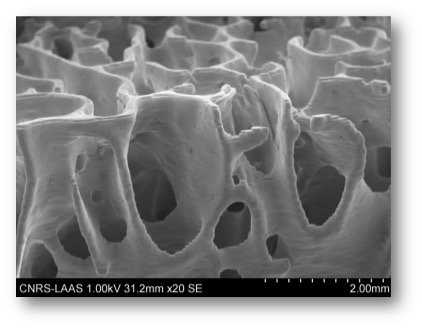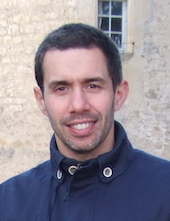Bioprinting
Bioprinting Cell Microenvironments :
Novel strategies based on bio-printing technologies (also referred to as additive manufacturing) appear as a new paradigm in the field of tissue engineering . Current strategies are devoted either to the fabrication of artificial scaffolds acting as a mechanical support for soft tissues or either to the direct printing of cells seeded within an extracellular matrix. This latter approach is intriguing as it can be used to mimic the topography of the natural cell microenvironment together with its cellular heterogeneity (ie controlling the position of cells in the 3D structure). The targeted goal consists in organizing directly differentiated cells and ultimately undifferentiated stem cells on a 3D biodegradable scaffold that will direct their fate: the scaffold should induce cell spreading and differentiation while promoting the formation of a functional tissue.
Our ambition is to validate new concept of additive manufacturing to control in 3D the assembly of cells, extracellular matrix (ECM) and supporting structure. These 3D models should recapitulate in a highly controllable and reproducible manner the tissue heterogeneity, its functionality and capacity to self evolve with time.
- Printing Bone Scaffolds :
Bone models can be reproduced by stereolythography starting from CT scan images. These scaffold are currently used as fantoms for echography (osteoporosis analysis) or as cell culture scaffolds for regenerative medicine (bone marrow).
Collaborations :
STROMALab (Toulouse, France), L. Sensébé and F. Dechazeau
Institut Curie (Paris, France) J.L. Viovy, S. Descroix, J. Camonis
Institut Langevin, ESPCI (paris, France) A. Derode
- Printing Soft tissues :
We develop new 3D printing technologies (patent pending) for the fabrication of artificial microenvironments integrating cells, extracellular matrix (ECM) materials and reproducing the topology and heterogeneity of functionnal tissues.
Collaborations :
CRCT (Toulouse, France), A.Besson, J. Creff
Institut Curie (Paris, France) J.L. Viovy, S. Descroix, J. Camonis
IRSD (Toulouse, France), A. Ferrand, N. Vergnolles
